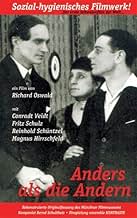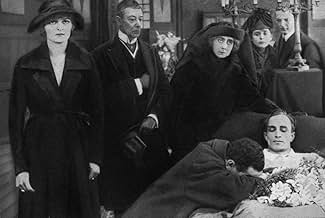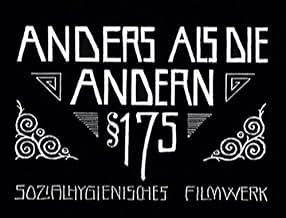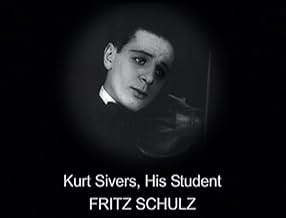PUNTUACIÓN EN IMDb
7,0/10
1,6 mil
TU PUNTUACIÓN
Dos músicos se enamoran, pero el chantaje y el escándalo hacen que el romance de un giro trágico.Dos músicos se enamoran, pero el chantaje y el escándalo hacen que el romance de un giro trágico.Dos músicos se enamoran, pero el chantaje y el escándalo hacen que el romance de un giro trágico.
- Dirección
- Guión
- Reparto principal
Reseñas destacadas
10Venarde
A frank story of homosexual love and tragedy made 85 years ago, featuring such amazing things as a same-sex dance hall and a drag ball as background to dramatic scenes. It still packs a wallop, thanks to its purpose as an impassioned plea for justice and a wonderful central performance by the Conrad Veidt. Kino has just released this reconstructed version of about 50 minutes, based in large part on a print discovered in Moscow, with intertitles and a few stills telling the rest. It's a an effective drama and a fascinating history lesson. A good bit is still missing, but the most amazing things turn up, so maybe more of Anders als die Andern will as well. To have this much is wonderful.
Conrad Veidt plays a famous musician who is blackmailed for being gay. Eventually he stands trial and is convicted. At the end the Film pleads for the abolition of § 175(The Paragraph which punishes homosexuality).
The making of such a film was only possible because after WWI there were no Censorship laws in Germany. After a wave of sexually explicit films they were reinstalled and 'Anders als die andern' was banned for the public in Aug.1920. Not until 1957 would homosexuality be a main topic in a film again (Anders als Du und Ich).
Sadly this historic film is lost. But Portions of it were incorporated into another film (Gesetze der Liebe/Laws of Love,1927) and survived. These have been restored to a length of 41 min..
The making of such a film was only possible because after WWI there were no Censorship laws in Germany. After a wave of sexually explicit films they were reinstalled and 'Anders als die andern' was banned for the public in Aug.1920. Not until 1957 would homosexuality be a main topic in a film again (Anders als Du und Ich).
Sadly this historic film is lost. But Portions of it were incorporated into another film (Gesetze der Liebe/Laws of Love,1927) and survived. These have been restored to a length of 41 min..
Interesting early film dealing with homosexuality and the laws in Germany at the time making it a crime punishable by a prison sentence. About a famous violin virtuoso, Paul (played by Conrad Veidt), who after a concert one evening is approached by a handsome young man named Kurt who idolizes and has a youthful crush on the older man. Kurt dreams of taking lessons from his idol, so visits the kimono-dressed man in his apartments where he is soon being given private violin lessons. The two men quickly become closer and closer, playing duets together on violin and piano, and taking strolls in the park arm and arm, but unfortunately a blackmailer sees them in the park - and seizes upon an opportunity to make himself some quick "hush money". Interestingly, the blackmailer himself hangs out in a nightclub full of women dressed as men, and pairs of men dancing together, which made me wonder - is he out to find himself another victim for blackmail here or is he himself?
This film is a reconstruction containing fragments, strung together in a well-done manner with intertitles and still photos describing and portraying the missing scenes. The print for the scenes that are intact look quite nice here, the music is appropriate and pleasing. Parts of the film almost come across as instructional, including a lecture given by a sexologist featuring a slide show of males and females mostly in various states of cross-dress. Conrad Veidt gives a very well-done, touching performance here, really giving off a keen sense of the strong relationship and love felt between Paul and Kurt. Well worth seeing.
This film is a reconstruction containing fragments, strung together in a well-done manner with intertitles and still photos describing and portraying the missing scenes. The print for the scenes that are intact look quite nice here, the music is appropriate and pleasing. Parts of the film almost come across as instructional, including a lecture given by a sexologist featuring a slide show of males and females mostly in various states of cross-dress. Conrad Veidt gives a very well-done, touching performance here, really giving off a keen sense of the strong relationship and love felt between Paul and Kurt. Well worth seeing.
It's a shame that about half of this film is lost, deliberately destroyed by the Nazis. What is odd is that probably the tamest portions of the film are missing - the parts with Paul Körner (Conrad Veidt) and his family, and the parts in which Paul interacts with Else, the girl who loves him. The parts that are missing though are masterfully replaced by still shots and enough inter-titles that you get a pretty good idea of how Paul gets along with his family.
The film was made after World War I during a brief time of relative tolerance for homosexuality in Germany, and rather than try to be titillating, the film tries to teach of the problems with the German law that made it a crime to be homosexual. Paul Körner is a famous violin virtuoso who harbors a terrible secret - he's gay and constantly in fear of being discovered and prosecuted under the law. As a result, you realize that Paul is a rather sad and lonely man despite his professional success, unable to openly express himself and look for a life-partner out in the open. Things change when Paul takes on a pupil, Kurt Sivers, a young man who idolizes Paul. Paul seems to really fall for Kurt, but you can tell that Kurt is still somewhat unsure of what to make of his own feelings at this point. Unfortunately, Kurt's sister Else loves Paul too, not knowing that Paul is unable to return the sentiment.
Paul is also being hounded by a blackmailer who first met him in a gay dance hall. When Paul mistook the blackmailer's advances as romantic, he took him back to his home and there the man spurned Paul and demanded money. You get the impression he's been hounding him ever since that time. What is odd is that the gay dance hall where he and Paul first met almost seems to be the blackmailer's second home, so I have to wonder why the blackmailer isn't afraid of being blackmailed himself.
There's a well done set of scenes with Paul looking back on his life - his adolescence at boarding school specifically - and the trouble he had there on account of his orientation. There's even a scene with a sexologist lecturing on homosexuality - oddly enough, this is how Paul explains to Else the truth of who he is and that his rejection of her is not personal.
Highly recommended as a good reconstruction of a lost silent film.
The film was made after World War I during a brief time of relative tolerance for homosexuality in Germany, and rather than try to be titillating, the film tries to teach of the problems with the German law that made it a crime to be homosexual. Paul Körner is a famous violin virtuoso who harbors a terrible secret - he's gay and constantly in fear of being discovered and prosecuted under the law. As a result, you realize that Paul is a rather sad and lonely man despite his professional success, unable to openly express himself and look for a life-partner out in the open. Things change when Paul takes on a pupil, Kurt Sivers, a young man who idolizes Paul. Paul seems to really fall for Kurt, but you can tell that Kurt is still somewhat unsure of what to make of his own feelings at this point. Unfortunately, Kurt's sister Else loves Paul too, not knowing that Paul is unable to return the sentiment.
Paul is also being hounded by a blackmailer who first met him in a gay dance hall. When Paul mistook the blackmailer's advances as romantic, he took him back to his home and there the man spurned Paul and demanded money. You get the impression he's been hounding him ever since that time. What is odd is that the gay dance hall where he and Paul first met almost seems to be the blackmailer's second home, so I have to wonder why the blackmailer isn't afraid of being blackmailed himself.
There's a well done set of scenes with Paul looking back on his life - his adolescence at boarding school specifically - and the trouble he had there on account of his orientation. There's even a scene with a sexologist lecturing on homosexuality - oddly enough, this is how Paul explains to Else the truth of who he is and that his rejection of her is not personal.
Highly recommended as a good reconstruction of a lost silent film.
"Anders als die Andern" (Different from the Others) is a 1919 German film starring Conrad Veidt that was pieced together and shown at one point on public television.
About a law on the books that makes homosexuality a crime, it had a very short run in Germany before being pulled, and people who attended the movie were harassed.
The lead is played by a German actor familiar to American audiences, usually for portraying a bad guy, Conrad Veidt. Despite dying in 1943, Veidt had a nearly 30-year career in films. Here he plays possibly the first gay character in cinema who, with such a law in place, is a target for a blackmailer.
A very interesting film with a wonderful performance by Veidt. Only part of the movie remains, but it has been put together as well as can be expected - it is, after all, a mere 102 years old. It's amazing how relevant some of the material in it remains today.
About a law on the books that makes homosexuality a crime, it had a very short run in Germany before being pulled, and people who attended the movie were harassed.
The lead is played by a German actor familiar to American audiences, usually for portraying a bad guy, Conrad Veidt. Despite dying in 1943, Veidt had a nearly 30-year career in films. Here he plays possibly the first gay character in cinema who, with such a law in place, is a target for a blackmailer.
A very interesting film with a wonderful performance by Veidt. Only part of the movie remains, but it has been put together as well as can be expected - it is, after all, a mere 102 years old. It's amazing how relevant some of the material in it remains today.
¿Sabías que...?
- CuriosidadesMagnus Hirschfeld, a prominent sexologist, co-wrote the screenplay and made a cameo appearance as The Doctor, with whom Paul Korner consults. A scene resembling that of the modern-day LGBT scene existed in Weimar Germany, albeit underground, and the scene at the gay bar featured actual LGBT individuals. The screenwriter and author Anita Loos said of this period, in 1923: "Any Berlin lady of the night might turn out to be a man: the prettiest girl on the street was Conrad Veidt, who later became an international film star." (It was Hirschfeld who coined the term 'transvestism.')
- Versiones alternativasThere is an Italian edition of this film on DVD, distributed by DNA srl, "DIVERSI DAGLI ALTRI: Alle Origini Del Cinema Gay - Special Edition" (4 Films on a single DVD: Mikaël, 1924 + Fireworks, 1947 + Un chant d'amour, 1950 + Anders als die Andern, 1919), re-edited with the contribution of film historian Riccardo Cusin. This version is also available for streaming on some platforms.
- ConexionesEdited into Gesetze der Liebe (1927)
Selecciones populares
Inicia sesión para calificar y añadir a tu lista para recibir recomendaciones personalizadas
- How long is Different from the Others?Con tecnología de Alexa
Detalles
- Fecha de lanzamiento
- País de origen
- Idiomas
- Títulos en diferentes países
- Different from the Others
- Localizaciones del rodaje
- Berlín, Alemania(unknown scenes)
- Empresas productoras
- Ver más compañías en los créditos en IMDbPro
- Duración
- 50min
- Color
- Mezcla de sonido
- Relación de aspecto
- 1.33 : 1
Contribuir a esta página
Sugerir un cambio o añadir el contenido que falta



























